Most owners feed their pets with the same foods they eat. For guinea pigs, most of the fresh produce we eat is also good for them. There are several food items that guinea pigs can’t eat and some that they can eat but are only very rare as a treat. Now let’s take a look at the very popular vegetable broccoli.
Can guinea pigs eat broccoli? Guinea pigs can eat broccoli and they absolutely love them. Broccoli is rich in vitamin C, which is very important for their health and it also contains other necessary vitamins and minerals that guinea pigs need daily. It is important to note that guinea pigs can eat every part of the broccoli plant.
In the following sections, we have given all of the aspects of broccoli and guinea pigs such as benefits, nutrition facts, risks, and much more. Let’s begin!
Table of Content
Is Broccoli Good for Guinea Pigs? | Health Benefits
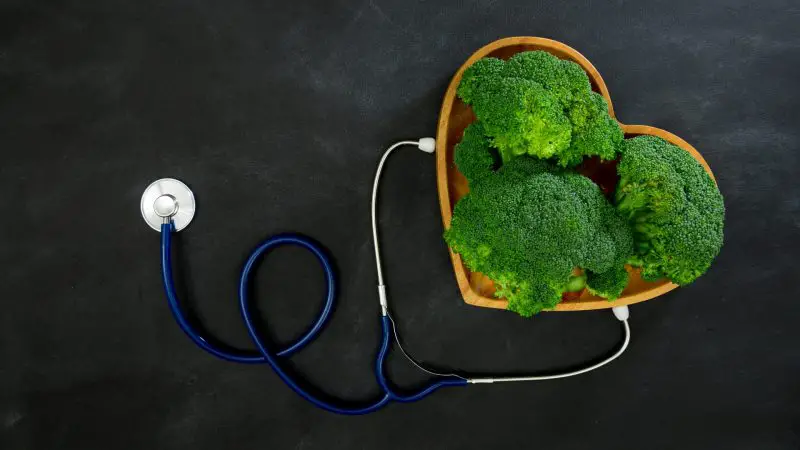
If you feed your guinea pig broccoli, it’s also important to know what are the health benefits for your little pet.
Vitamin C and Prevention from Scurvy Disease
There is one major benefit for guinea pigs. They can’t produce vitamin C naturally, but luckily, broccoli is abundant in this essential vitamin. The guinea pigs can get a disease called scurvy when they have a very serious deficit in vitamin C.
The guinea pigs are not capable of synthesizing and keeping vitamin C in their organisms. This is why some guinea pigs need oral vitamin C supplements. But these can be skipped most of the time if you feed them broccoli and other vitamin C-rich foods.
Protects Against Free Radicals
So, basically, the vitamin C in broccoli is a powerful antioxidant that keeps any organism healthy against the damages of free radicals, which age the organism faster than usual. Also, your guinea pig will get enough fibers for a healthy digestive system and intestine work. But if eaten in excess, these fibers will disturb the guinea pig’s digestive system.
Loaded With Essential Nutrients
Broccoli is an amazing source of protein and fiber as well. Some even consider it to be a superfood as it contains a vast amount of essential vitamins and minerals such as vitamins A, vitamin C, vitamin E, vitamin K, iron, potassium, calcium, selenium, magnesium, and many others as well.
Nutrition Facts of Broccoli for Guinea Pigs
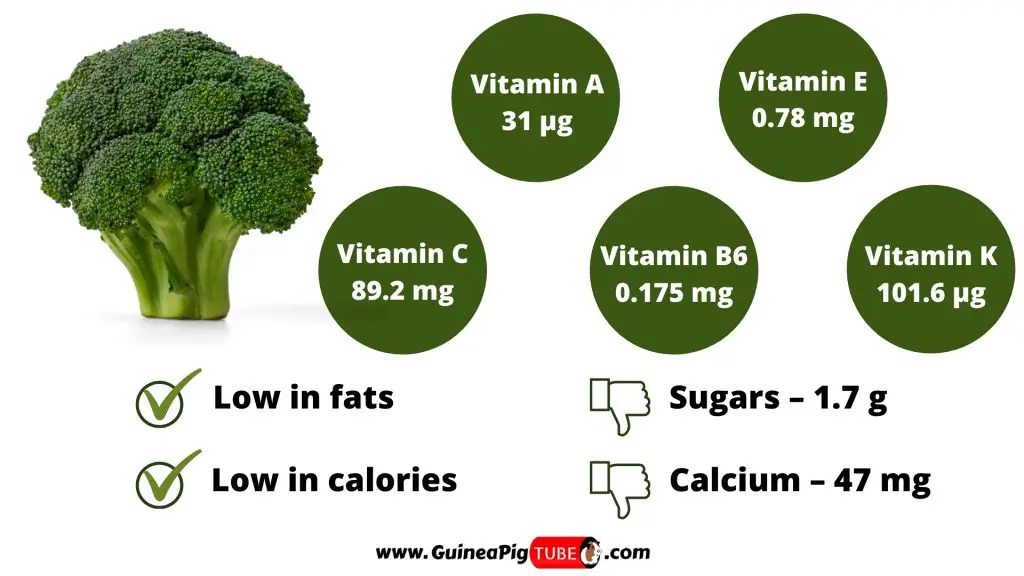
In addition to the health benefits of guinea pigs eating broccoli, it’s also good to know the exact nutrition facts of the broccoli. The following are the nutritional facts of broccoli per 100 g:
- Energy – 39 kcal
- Protein – 2.57 g
- Total lipid (fat) – 0.34 g
- Carbs – 6.27 g
- Dietary Fiber – 2.4 g
- Sugars – 1.4 g
- Calcium – 46 mg
- Iron – 0.69 mg
- Magnesium – 21 mg
- Phosphorus – 67 mg
- Potassium – 303 mg
- Sodium – 36 mg
- Vitamin C – 91.2 mg
- Vitamin B-6 – 0.191 mg
- Vitamin A – 8 µg
- Vitamin E – 0.15 mg
- Vitamin K – 102 µg
- Thiamin – 0.077 mg
- Riboflavin – 0.114 mg
- Niacin – 0.639 mg
- Folate – 65 µg
- Lutein + zeaxanthin – 745 µg
Is Broccoli Bad for Guinea Pigs? | Possible Risks
We need to be careful when feeding vegetables and fruits to guinea pigs because if we give them large serving sizes there are some potential risks that can arise. So, in the following section find out some potential risks of broccoli to guinea pigs if eaten in excess. Let’s begin!
Bladder and Kidney Stones
The most serious risk for guinea pigs caused by eating too much broccoli is that they can get bladder and kidney stones. Broccoli is very abundant in oxalates. The oxalates can often create stones in the urinary tract of the guinea pig. These crystal stones are made of calcium salts and these appear mostly in the urethra and bladder of guinea pigs.
The following are the symptoms of possible urinary stones in guinea pigs: small and straining urinations, incontinence, blood in urine, inflamed genital skin, weight loss, and lethargy. This problem can be addressed in time with a change of diet, proper exercise, and hydration. In some cases, surgery is needed and proper resting afterward with good nutrition. Foremost, good hydration is the key to prevention, and also no more than 2-3 times of broccoli per week for guinea pigs.
Problematic Digestive Tract and Diarrhea
The other risk of feeding the cavy with too much broccoli is disturbed digestive tract and diarrhea. The symptoms are dehydration and lethargy, belly pain, no appetite, loose stool, and even in some cases, their fur becomes rougher in texture. With proper hydration and by lowering the broccoli intake per week, their health state can be improved.
Serving Size and Frequency of Broccoli for Guinea Pigs
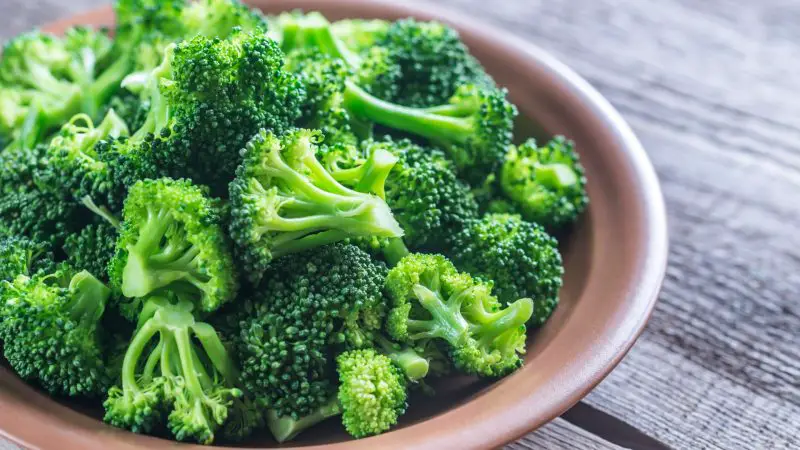
Guinea pigs love to munch on broccoli like it’s their favorite vegetable. Broccoli is very affordable, and it doesn’t even have to be prepared in a special way for the guinea pig to love it. But, how often should it be given to them? Let’s find out!
Can Guinea Pigs Have Broccoli Every Day?
It’s obvious that broccoli has many benefits for guinea pig’s health and body. However, guinea pigs shouldn’t eat broccoli every day. It is enough to feed the guinea pig with broccoli 2 to 3 times per week. This frequency is enough for proper nutrition with this veggie.
We mentioned that broccoli has fibers that are good for the guinea pig’s digestion. But too much broccoli can also cause counter effects like bloating, gas, and diarrhea.
How Much Broccoli Can Guinea Pigs Eat?
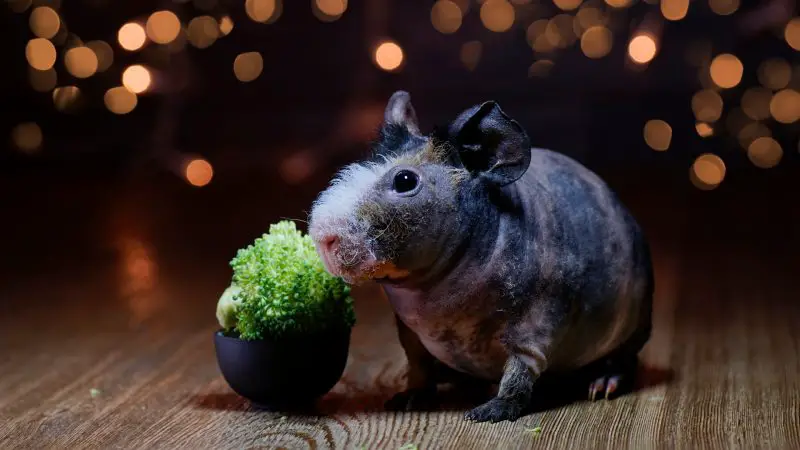
The recommended serving size of broccoli for a guinea pig is ½ floret with the whole stalk underneath. You can also peel the stalk so that the guinea pig enjoys munching it better.
There is also a good diet schedule to remember. You can feed the guinea pig with broccoli leaves one day and heads with stem another day. This process provides variety and you can divide the broccoli better when you plan the guinea pig meals with broccoli for the entire week. Just remember not to overfeed the cavy with broccoli because it might get bloated, gassy, or even get bladder stones.
Do Guinea Pigs Like Broccoli?
Most of the guinea pigs like broccoli and they really enjoy eating it. Broccoli is very tasty for them and they will be happy every time you give broccoli to them.
Same as for the other vegetables like cauliflower, celery, spinach, and others, you need to give them broccoli only in moderation, not every day, and not in large serving sizes even if they want more.
More Information About Guinea Pigs and Broccoli
In the following sections, you can read more about the other parts and types of broccoli for guinea pigs. Find out can guinea pigs eat broccoli stalks, leaves, and heads but also cooked or frozen broccoli and more.
Can Guinea Pigs Eat Broccoli Stems / Stalks?
Guinea pigs can eat broccoli stems or stalks and they really enjoy them. Some guinea pigs owners have reported that their guinea pigs like broccoli stem even more than other parts. Just pay attention to the serving sizes of broccoli stems and give them only in moderation or as a treat.
Broccoli stems or stalks are rich in nutrients just like broccoli florets or heads. If the broccoli stem seems too thick and massive, chop it up or slice it lengthwise before you give it as a treat.
Can Guinea Pigs Eat Broccoli Leaves?
Guinea pigs can eat broccoli leaves as they contain large amounts of vitamins and minerals that are very good for guinea pig’s health. Also, these leaves have less calories and sugars than other parts of broccoli. So, broccoli leaves for guinea pigs are good food.
When you feed the leaves of broccoli to the guinea pig, give it sparingly because they have a lot of vitamin A which can build up in excess. And we all know that anything in excess, even if it is a type of good food, can cause undesired effects.
Can Guinea Pigs Eat Broccoli Heads or Florets?
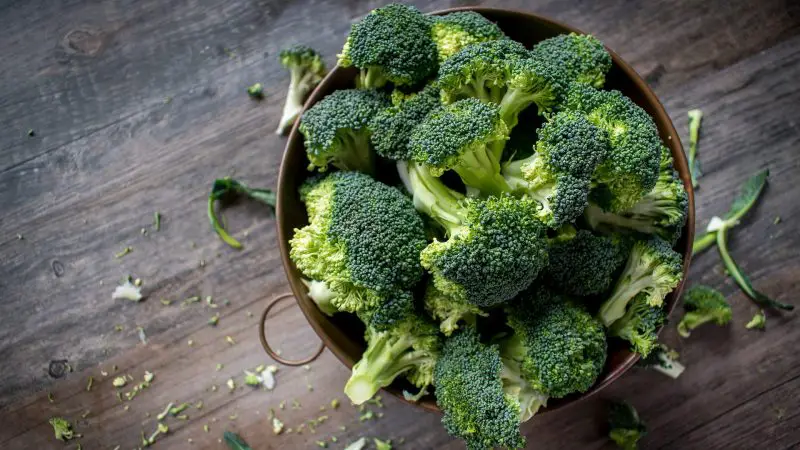
Guinea pigs can eat broccoli heads or florets and this part of broccoli is very delicious for them. Broccoli florets are very soft to eat and in addition, they also have many health benefits. Just be sure to give them broccoli florets only as a treat, which means not every day and not in huge amounts. Also, it’s important to wash broccoli florets thoroughly with water before giving them to guinea pigs due to the possibility of the pesticide presence.
Can Guinea Pigs Have Raw Broccoli?
People shouldn’t eat raw broccoli because it would be very hard for them to digest it. However, guinea pigs can eat raw broccoli and that’s the only way they can eat them. Only give them raw and fresh broccoli, never cooked broccoli. Fresh and raw broccoli even have better nutrients than the cooked ones. You don’t need any special preparation of the broccoli for guinea pigs, just wash them and slice into smaller parts.
Can Guinea Pigs Eat Cooked Broccoli?
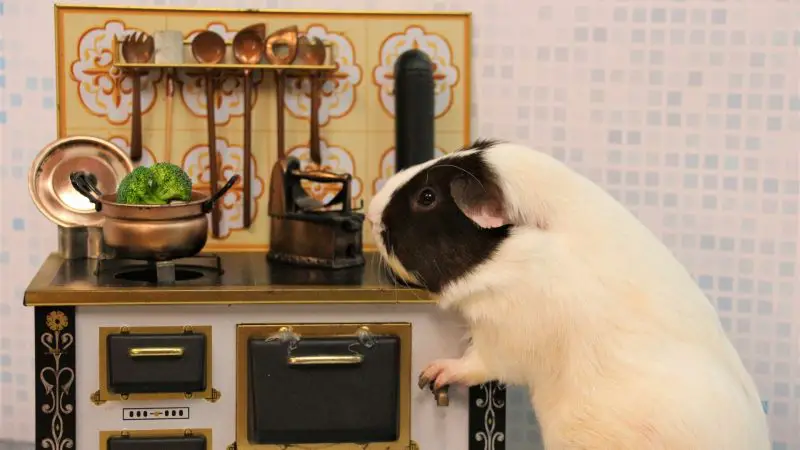
Guinea pigs can’t eat cooked broccoli or any other type of cooked food. They can’t digest cooked foods, unlike us humans. Guinea pigs are herbivores, their digestive system is very sensitive, and cooked food can be very harmful to them.
Can Guinea Pigs Eat Frozen Broccoli?
Guinea pigs can eat frozen broccoli that wasn’t previously processed. Naturally, before giving them frozen broccoli, it needs to be defrosted on the room temperature. Giving them frozen food that was previously boiled or processed before freezing can be very harmful to their stomach and digestive system. Vegetables are generally processed in some way before freezing.
Can Guinea Pigs Eat Broccoli Rabe?
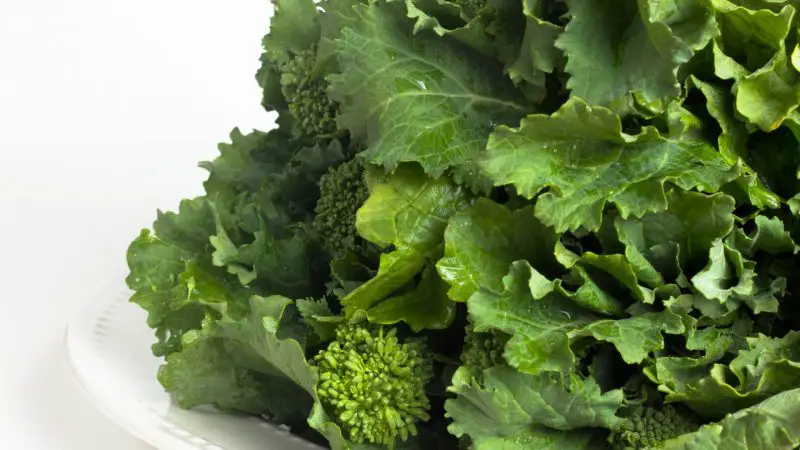
Broccoli rabe is also known as rapini and it’s actually a leafy vegetable that is closely related to a turnip. Guinea pigs can eat broccoli rabe or rapini. Broccoli rabe is rich in many vitamins and minerals such as vitamin C, vitamin A, and vitamin K. Also, there is a lot of calcium, which isn’t good for guinea pigs in larger amounts, so be careful with the serving sizes. Don’t feed guinea pigs with broccoli rabe very often and not every day.
Can Guinea Pigs Eat Broccoli Slaw?
Broccoli slaw is a salad that is prepared using raw broccoli stalks and other vegetables. Guinea pigs can’t eat broccoli slaw if it contains any processed products. As we have said guinea pigs can’t eat any cooked or processed food. Broccoli slaw is especially dangerous for guinea pigs because it contains many different ingredients, like mayonnaise, salt, pepper, vinegar, and others.
Can Guinea Pigs Eat Sprouting Broccoli?
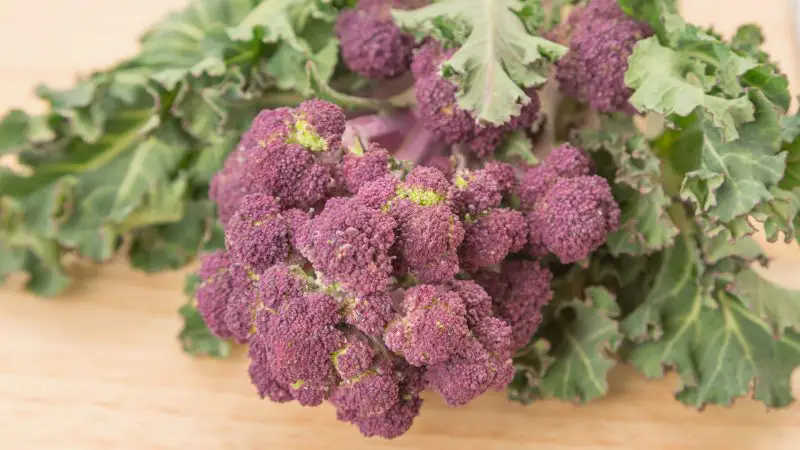
Guinea pigs can eat sprouting broccoli, both white or purple. This type of broccoli also has many nutrients that are healthy for guinea pigs if feed in moderation. Guinea pigs can eat purple sprouting broccoli leaves, but also in small serving sizes and not very often.
Quick Facts on Broccoli
The following are some of the quick facts about broccoli:
- Broccoli is abundant in vitamin C, which is the most beneficial vitamin for the guinea pigs.
- Too much broccoli can cause bladder stones in guinea pigs if it gets combined with similar foods.
- Guinea pigs can also get diarrhea from eating too much broccoli.
- Guinea pigs cannot eat cooked broccoli.
- Broccoli can be given to guinea pigs a maximum of 3 times per week.
- A substitute for broccoli can even be cauliflower.
- Guinea pigs love the flowers, head, and the stalk parts of broccoli, but their favorite is the leaves around the broccoli.
- A normal serving is half a floret with the stalk underneath it, and on a different day the leaves separately.
As you can see, broccoli is very healthy, not just for us humans (even though some of us dislike this healthy veggie), but for guinea pigs too. They especially need broccoli because of vitamin C which keeps them in perfect health overall.
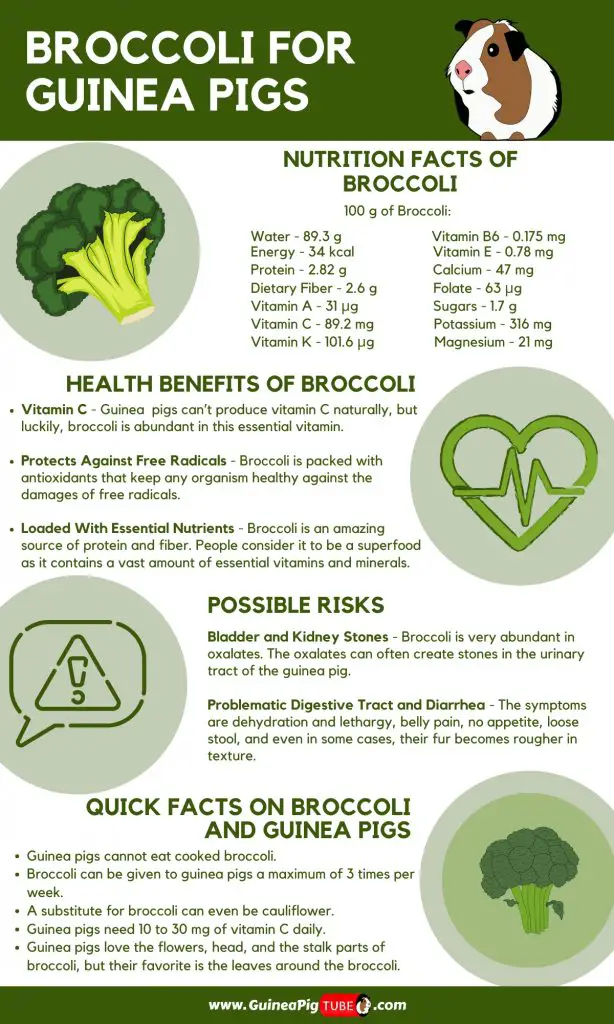
With food, you should be careful what to choose. If you are not sure what to feed them but believe your little piggies deserve some great treats, check our Helpful Guide to the Best Guinea Pig Treats to get some ideas.
We have also made a full list of foods that guinea pigs can and can’t eat (150+ Types of Foods). Be sure to also check our recommended products page for everything you will ever need to assure a happy life for your Guinea Pigs. Hope this information was helpful and you have found the answer you were looking for.
List of Sources
Vitamin C Requirements of the Guinea-Pig
The Guinea-Pig: General Husbandry and Nutrition
The Effects of Diet on Anatomy, Physiology and Health in the Guinea Pig
Potential Health Benefits of Broccoli- A Chemico-Biological Overview
Health Benefits and Possible Risks of Broccoli – An Overview
